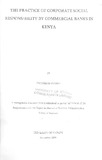| dc.description.abstract | Corporate Social Responsibility (CSR) is increasingly a core component of
corporate strategy in the global economy. In recent years its importance
has become even greater, primarily because of financial scandals,
investors' losses, and reputational damage to listed companies. While
corporations are busy adopting and enhancing CSR practices, there is
(beyond very few notable exceptions) little empirical research on CSR's
practice by Commercial Banks in Kenya and the challenges related to it.
I propose an economically coherent analysis of Corporate Social
Responsibility (CSR), and suggest the challenges related to it. CSR is
defined as a program of actions taken to reduce externalized costs or to
avoid distributional conflicts. It is an institution that has evolved in
response to market failures, a coasion solution to some problems
associated with social costs. As mentioned earlier the objective of the •...
study was to establish how Commercial Banks in Kenya practice CSR
and the challenges they face. The study targeted corporate managers
involved in CSR.
A descriptive survey was used and the questionnaire consisted of open
ended structured and semi structured questions which was pretested for
clarity. 'Drop and Pick later' method was used to administer the
questions to the respondents in different Commercial Banks in Nairobi.
The study was a census survey. The data was analysed using frequency
distribution and percentages. Content analysis was also used to analyse
unstructured questions.
The results showed that in most of the companies, the Functional group
in a company such as the Foundation, Marketing Department, and PR
Department Etc initiates CSR programs with the blessing of the CEO.
The entry point for CSR practice has been concentrated on two aspects:
community work and PR. Also getting the other functional groups
involved in embedding the CSR strategy into the way the company plans
and implements products and services is rare.
More findings revealed that most companies leave the CSR
implementation to the corporate foundation or its equivalent, while half
say they let the public relations or corporate communications group take
the lead. Next to the community, the employees are the stakeholders
that the companies target for their CSR. Investors are low priority. The
limitations for the study were evident.
Though the study was generally successful, it was faced by some
limitations. First of all, only two thirds of the selected organizations
comprising 65.71 percent took part in the study. 34. 29 percent did not
take part in the study. This means that the study cannot be generalized
to the entire banking industry. Also the study was carried out within
limited time and resources. This constrained the scope as well as the
depth of the research. The study also focused on management
perspective. It would have been of value to obtain views of other
stakeholders as well.
Finally the researcher suggested that a comprehensive study be
undertaken which involves other stakeholders such as the community
and others. A narrower case study of individual banks was also
necessary to avoid generalization. Besides another detailed study to
address solutions to the CSR challenges was deemed necessary. | en |

